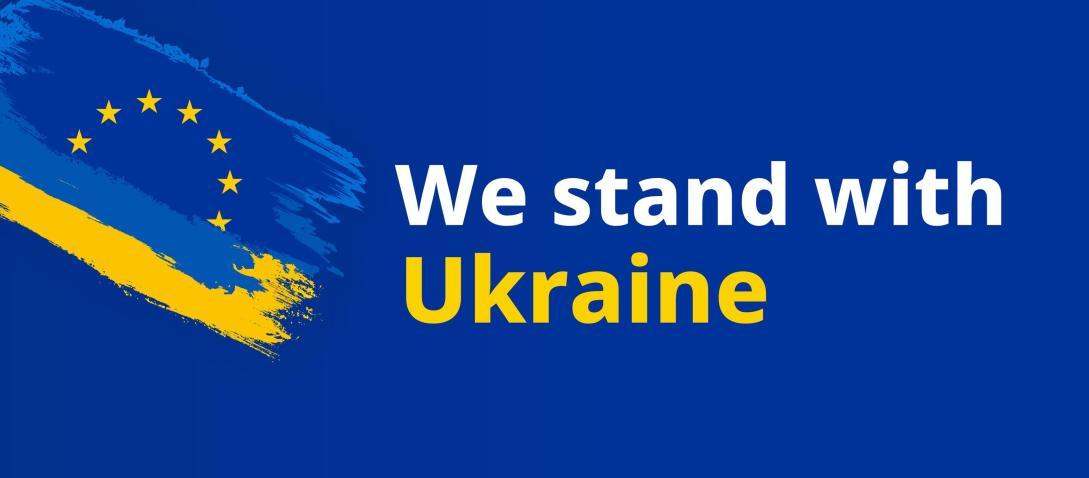Three Years After the Russian Full-Scale Invasion of Ukraine

Three Years After the Russian Full-Scale Invasion of Ukraine
A Just and Lasting Peace in Ukraine:
where European and African Perspectives Meet
On Monday [24.02.25], Ukraine marked three years of suffering and occupation of its territory by Russia. On that day, European Union Presidents, Ursula von der Leyen and António Costa, visited Kyiv to honour the fallen – and those still fighting on the frontlines. Europe stands with Ukraine, empowering its brave resistance.
As the European Union's Ambassador to Uganda, I cannot accept that a brotherly nation is stripped of its sovereign rights because of a reckless and powerful neighbour. For me, this is not just about Ukraine – it is about the world we want to live in. If we allow force to dictate borders, then no nation – whether in Europe or Africa – will ever truly be safe.
Debunking the NATO Expansion Myth
One of the arguments I often hear in Africa is that NATO’s enlargement provoked Russia’s invasion. But this claim tells us more about Russia’s imperial mindset than about actual security concerns. As EU Foreign Policy Chief Kaja Kallas aptly put it: "Putin is not concerned about NATO – if he was, he would not be pulling his troops from the borders of NATO to fight in Ukraine – he is more concerned about the expansion of democracy and the values that nations freely choose to embrace."
Russia’s actions are not defensive – they are expansionist. Moscow views the sovereignty of its neighbours as a threat, not because of security concerns, but because their independence challenges its imperial ambition. Where we see Ukraine exercising its legitimate right to choose its alliances and build its future, Russia sees a threat to its outdated sphere of influence. Where we witness NATO responding to the democratic aspirations of Eastern European nations seeking security guarantees, Russia projects its own desire for domination onto others, imagining aggressive intent where none exists.
Russia’s War and Its Colonial Legacy
There is another uncomfortable truth about this war, which resonates with Africa’s historical experience: Russia is the last major European colonial empire. While Western European powers gradually decolonized in the 20th century, Russia expanded, absorbing and subjugating numerous peoples under Moscow’s rule. The Russian Federation is not a normal nation-state – it is a vast imperial construct, assembled through conquest over centuries. The idea that Russia’s size was somehow divinely granted is a fiction; it is the product of wars, annexations, and the suppression of smaller nations—from Chechnya and Tatarstan to Siberia and Central Asia.
Ukraine, like many nations within and around Russia, has long fought to break free from this imperial grip. What we are witnessing today is not just an invasion but a colonial war of subjugation – a desperate attempt by the Kremlin to prevent an independent Ukraine from slipping out of its control. Africa, having fought so hard to break free from colonial rule, knows the damage imperialism inflicted on its own people. These struggles were legitimate, and then, I would think, Africa should also understand Ukraine as it defends its own true independence.
Sovereignty Matters – For Africa and Europe
The Russian worldview – seeing consensual arrangements between sovereign states as hostile acts – also overlooks why Ukraine matters for Africa. When Russia invaded Ukraine, it violated fundamental principles that protect all nations, including African ones. Africa has long defended the principle that borders must not be changed by force. This war is not just about Ukraine's sovereignty – it is about sovereignty of all nations, everywhere!
The claims I sometimes hear, that the European Union has merely followed American leadership misrepresents reality. If anything, Russian imperialism has strengthened Europe's strategic autonomy. As EU High Representative/Vice President Kaja Kallas emphasized, "For any peace deal regarding Ukraine to work, it has to involve the Europeans as well as the Ukrainians." Europe has its own clear strategic interests in ensuring that sovereignty, territorial integrity, and international law prevail and that conflicts are resolved through diplomacy, not aggression.
Africa’s Role in Achieving a Just Peace
The European Union seeks a just, lasting and comprehensive peace that aligns perfectly with African interests and principles of conflict resolution, emphasising inclusive dialogue and respect for sovereignty; I have seen firsthand how African nations have skilfully navigated delicate peace processes – from the Great Lakes region to the Horn of Africa. Lasting peace cannot be built on appeasement – it must be founded on justice and respect for international law.
Looking ahead, the resolution of Russia’s full-scale war against Ukraine must incorporate elements that matter to both continents: respect for sovereignty and territorial integrity, accountability for violations of international law, and a security architecture that protects all nations, not just the powerful ones. Africa's experience in peace-building and its interest in a stable international order make its voice crucial in shaping the path forward. The stakes are too high for Africa to stand aside.
A Call to Action – a Call for Reason
The European Union stands ready to work with our African partners to achieve a just peace – one that upholds, rather than undermines, the international rules that protect us all. These are not Western values; they are universal principles that protect all nations, African and European alike. As an African proverb wisely says, “A man who uses force is afraid of reasoning”. Let us reject the logic of might over right and move beyond viewing the Russian full-scale invasion of Ukraine through the lens of great power competition. Instead, let us use the principles that matter to all nations and build a just, lasting and comprehensive peace!
The op-ed written by Ambassador Jan Sadek was published by The Daily Monitor and The Observer newspapers.
CONTACT DETAILS
Emmanuel D. Gyezaho, Press and Information Officer
